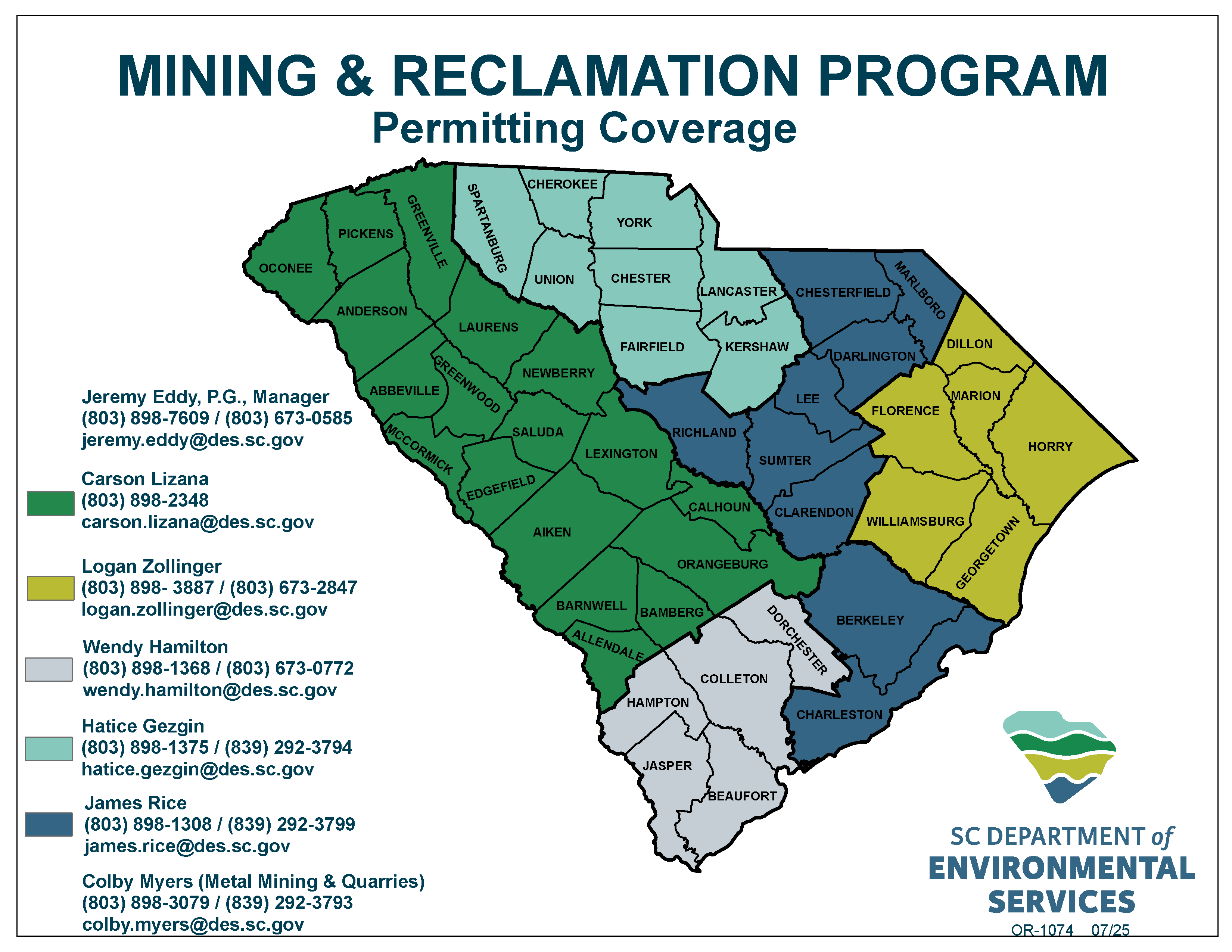Originally passed in 1974, and amended in 1990, the S.C. Mining Act was enacted to ensure that all lands and waters involved in mining within the state receive the greatest practical degree of protection and restoration. The Regulations (R.89-10 through R.89-350) were promulgated to better define how to enact the Mining Act. These two documents create protections for the surrounding environment and require reclamation of land affected by mining. There are approximately 500 permitted mine sites across the state, mostly mining sand, clay, and topsoil. Other materials mined in South Carolina include granite, limestone, vermiculite, kaolin, sericite, shale, and the only active, industrial-sized gold mine on the east coast. Our Active Mines Viewer is an interactive map that shows the location and basic information for these sites and is updated daily.
What is Mining?
Simply put, the Mining Act defines “mining” as the removal of ores or mineral solids from natural deposits in the ground. It also includes the removal of overburden lying on top of the natural deposits, as well as the breaking of the surface soil to facilitate the removal of said ores or mineral solids for specific purposes.
Mining does not include the following:
- excavation or grading when conducted solely in aid of on-site farming or on-site construction;
- operations engaged in the harvesting of oysters, clams, or the removal of shells from coastal bottoms;
- plants engaged in processing minerals (except as the plants are an integral on-site part of the removal or ores or mineral solids);
- exploration borings or corings;
- geophysical and geochemical sampling and analysis;
- activities of the Department of Transportation (or a person acting under contract with them) when the material is used solely for the construction, repair, and maintenance of the public road system;
- activities of the S.C. State Ports Authority (or a person acting under contract with them) when the material is used solely for the construction, repair, and maintenance of shipping container terminals;
- activities of the Department of Commerce’s Division of Public Railways (or a person acting under contract with them) when the material is used solely for the construction, repair, and maintenance of the public rail infrastructure; or
- recreational gold panning.
Any activity that meets the definition of mining requires a mine permit unless explicitly exempted. If you have any questions on whether your activity requires a mine permit, please contact the Mining & Reclamation Program at askmines@des.sc.gov.

Mining General Permit
The Mining General Permit authorizes mining operations with limited scope. The following limitations apply:
- May only excavate sand, clay, and/or topsoil;
- May only affect up to 5 acres of land;
- Allows a maximum depth of 20 feet;
- Does not allow any processing of material;
- Cannot be co-located with another Mining General Permit on the same tract of land, on an adjacent tract of land, or on a neighboring tract of land.
The operator will be required to complete reclamation of the mine in accordance with the approved Reclamation Plan. The operator is required to submit a $10,000.00 financial assurance mechanism to ensure successful reclamation of the site.
Additional Requirements
The applicant is required to apply for and receive a National Pollution Discharge Elimination System (NPDES) General Permit for Non-Metal Mineral Mining or a No Discharge Permit. Coverage under these permits is granted by SCDES’s Bureau of Water; the application must be submitted through our ePermitting system. Coverage under the Mining General Permit will not be granted until coverage is first granted under the NPDES permit.
If the site is located in one of the eight coastal counties (Beaufort, Berkeley, Charleston, Colleton, Dorchester, Georgetown, Horry, or Jasper), a Coastal Zone Consistency (CZC) determination must be approved by SCDES’s Bureau of Coastal Management. The application must be submitted through our ePermitting system. Coverage under the Mining General Permit cannot be granted until the CZC is approved.
Additional local, state, and/or federal approvals may need to be obtained. It is the responsibility of the applicant to ensure that all required permissions are obtained.
Individual Mine Operating Permit
The Individual Mine Operating Permit covers all other mining activities. There are no intrinsic limitations to the type of material, affected acreage, depth, processing, or frequency of other mine sites. The operator will be required to complete reclamation of the mine in accordance with the approved Reclamation Plan. The operator is required to submit a financial assurance mechanism in an appropriate amount, approved by the Department.
Additional Requirements
The applicant is required to apply for and receive an NPDES General Permit for Non-Metal Mineral Mining or a No Discharge Permit. Coverage under these permits is granted by SCDES’s Bureau of Water; the application must be submitted through our ePermitting system. Coverage under the Mining General Permit will not be granted until coverage is first granted under the NPDES permit.
If the site is located in one of the eight coastal counties (Beaufort, Berkeley, Charleston, Colleton, Dorchester, Georgetown, Horry, or Jasper), a CZC determination must be approved by SCDES’s Bureau of Coastal Management. The application must be submitted through our ePermitting system. Coverage under the Mining General Permit cannot be granted until the CZC is approved.
Additional local, state, and/or federal approvals may need to be obtained. It is the responsibility of the applicant to ensure that all required permissions are obtained.
Certificate of Exploration
A certificate of exploration is required for exploration activities, which includes the development of open pits, trenches, open cuts, or tunneling. It may only cover an area 2ac or less. A certificate of exploration is not required for an area already covered by an operating permit or for drilling core holes, drilling bore holes, or conducting geophysical and geochemical sampling and analysis. A certificate of exploration is considered as confidential trade secrets and proprietary business information, and is exempt from disclosure under the Freedom of Information Act. Please contact the Department directly (askmines@des.sc.gov) with any questions regarding a certificate of exploration.

